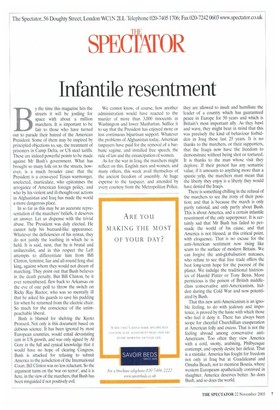Infantile resentment
By the time this magazine hits the streets it will be jostling for space with about a million marchers. It is important to be fair to those who have turned out to parade their hatred of the American President. Some of them may be inspired by principled objections to, say, the treatment of prisoners in Camp Delta, or US steel tariffs. These are indeed powerful points to be made against Mr Bush's government. What has brought so many folk on to the streets, however, is a much broader case: that the President is a cross-eyed Texan warmonger, unelected, inarticulate, who epitomises the arrogance of American foreign policy, and who by his violent and ill-thought-out actions in Afghanistan and Iraq has made the world a more dangerous place.
In so far as this may be an accurate representation of the marchers' beliefs, it deserves an answer. Let us dispense with the trivial abuse. The President was duly elected. He cannot help his buzzard-like appearance. Whatever the deficiencies of his syntax, they do not justify the loathing in which he is held. It is said, next, that he is brutal and unilateralist, and in this respect the Left attempts to differentiate him from Bill Clinton, feminist, liar and all-round feng shui king, against whom they would not dream of marching. They point out that Bush believes in the death penalty. But Bill Clinton, be it ever remembered, flew back to Arkansas on the eve of one poll to throw the switch on Ricky Ray Rector, who was so mentally ill that he asked his guards to save his pudding for when he returned from the electric chair. So much for the conscience of the unimpeachable liberal.
Bush is blamed for shelving the Kyoto Protocol. Not only is this document based on dubious science. It has been ignored by most European countries, would entail devastating cuts in US growth, and was only signed by Al Gore in the full and cynical knowledge that it would have no hope of clearing Congress. Bush is attacked for refusing to submit America to the jurisdiction of the International Court. Bill Clinton was no less reluctant. So the argument turns on the 'war on terror', and it is here, in the view of the marchers, that Bush has been misguided if not positively evil. We cannot know, of course, how another administration would have reacted to the murder of more than 3,000 innocents in Washington and lower Manhattan. Suffice it to say that the President has enjoyed more or less continuous bipartisan support. Whatever the problems of Afghanistan today, American taxpayers have paid for the removal of a barbaric regime, and installed free speech, the rule of law and the emancipation of women.
As for the war in Iraq, the marchers might reflect on this. English men and women, and many others, this week avail themselves of the ancient freedom of assembly. At huge expense to the taxpayer, and attended by every courtesy from the Metropolitan Police, they are allowed to insult and humiliate the leader of a country which has guaranteed peace in Europe for 50 years and which is Britain's most important ally. As they bawl and wave, they might bear in mind that this was precisely the kind of behaviour forbidden in Iraq these last 25 years. It is no thanks to the marchers, or their supporters, that the Iraqis now have the freedom to demonstrate without being shot or tortured. It is thanks to the man whose visit they deplore. If their protest has any semantic value, if it amounts to anything more than a spastic yelp, the marchers must mean that the liberty they enjoy is a liberty they would have denied the Iraqis.
There is something chilling in the refusal of the marchers to see the irony of their position; and that is because the march is only partly rational, and only partly about Bush. This is about America, and a certain infantile resentment of the only superpower. It is certainty sad that Mr Bush has failed to persuade the world of his cause, and that America is not blessed, at this critical point, with eloquence. That is no excuse for the anti-American sentiment now rising like scum to the surface of modern Britain. We can forgive the anti-globalisation nutcases, who refuse to see that free trade offers the best long-term hope for the poorest of the planet. We indulge the traditional histrionics of Harold Pinter or Tony Benn. More pernicious is the poison of British middleclass conservative anti-Americanism, hidden during the Cold War and now potentiated by Bush.
That this new anti-Americanism is an ignoble feeling, to do with jealousy and impotence, is proved by the haste with which those who feel it deny it. There has always been scope for cheerful Churchillian exasperation at American folly and excess. That is not the feeling abroad among conservative antiAmericans. Too often they view America with a cold, snotty, arabising, Philbyesque contempt, and openly desire her defeat. That is a mistake. America has fought for freedom not only in Iraq but at Guadalcanal and Omaha Beach, not to mention Bosnia, where western Europeans apathetically connived in slaughter. America deserves better. So does Bush, and so does the world.


























































































 Previous page
Previous page